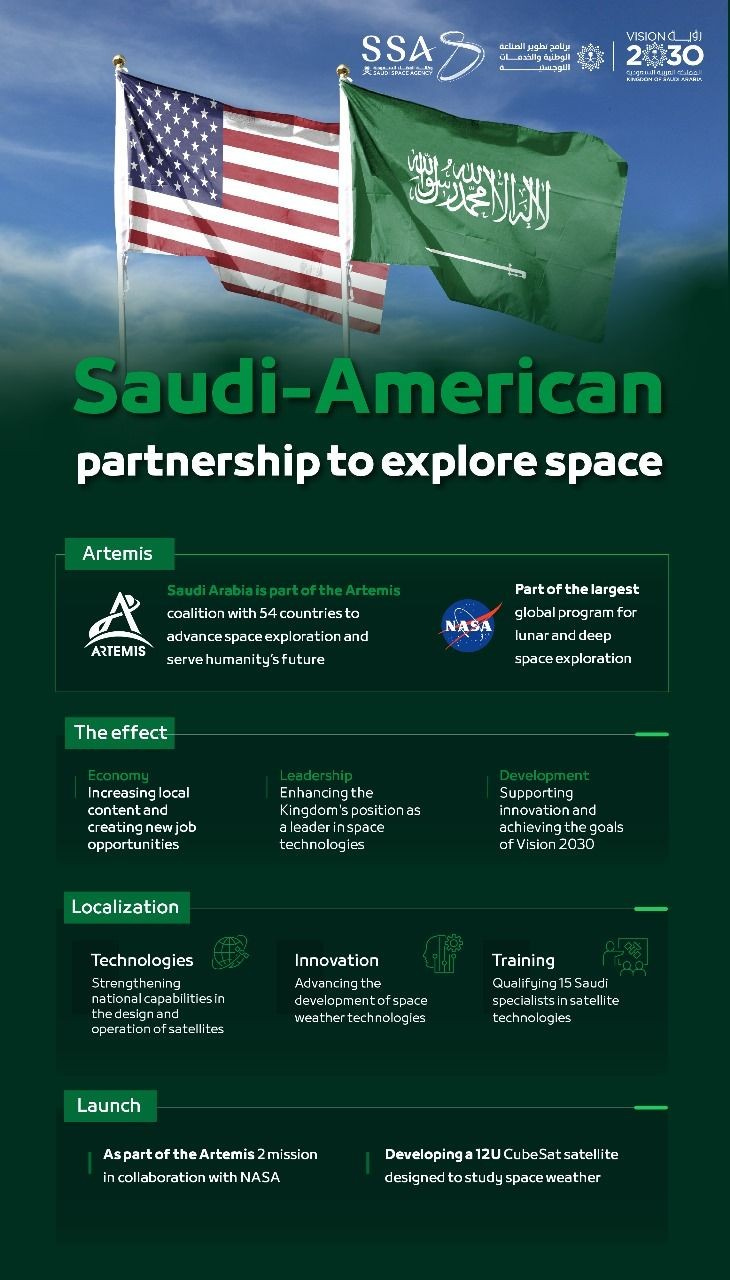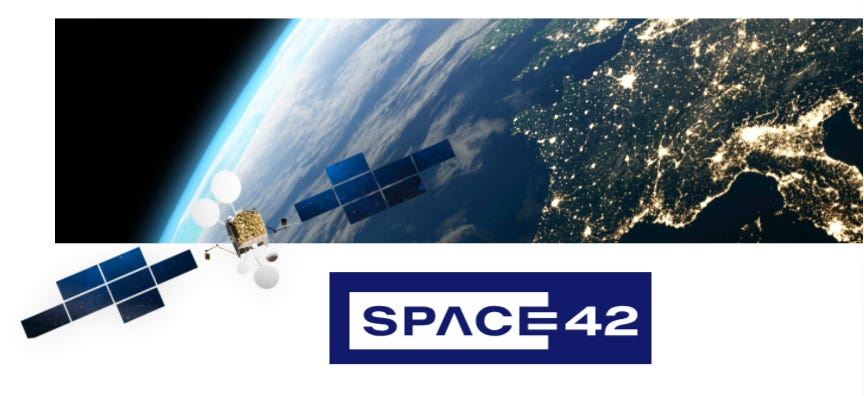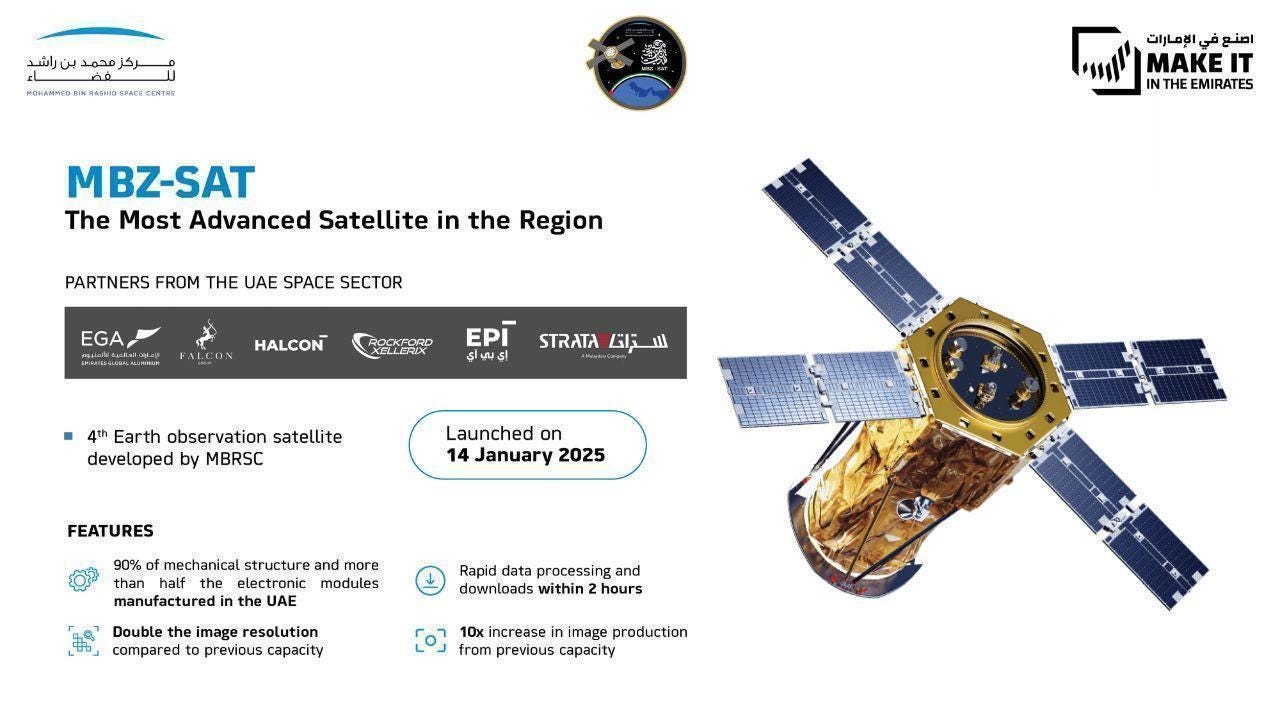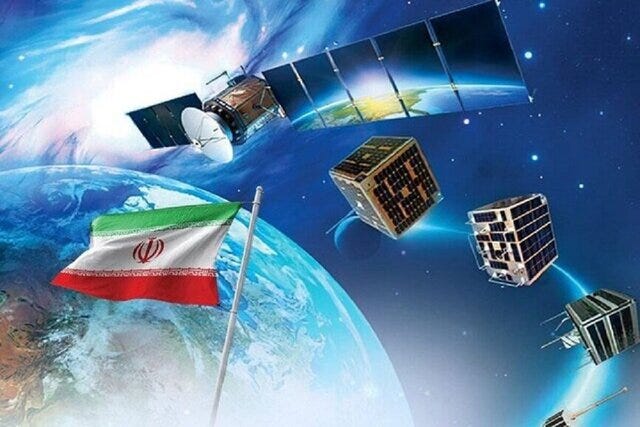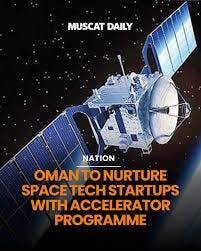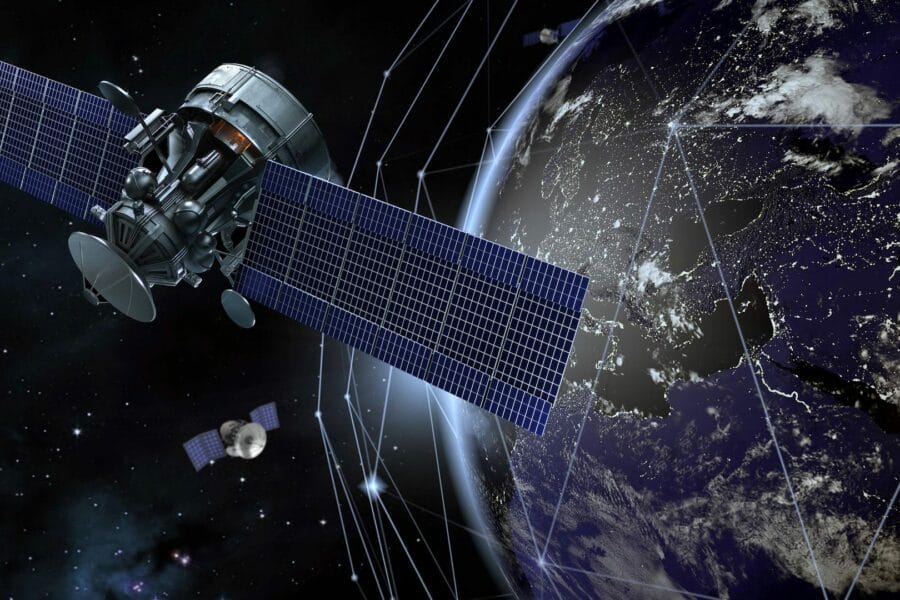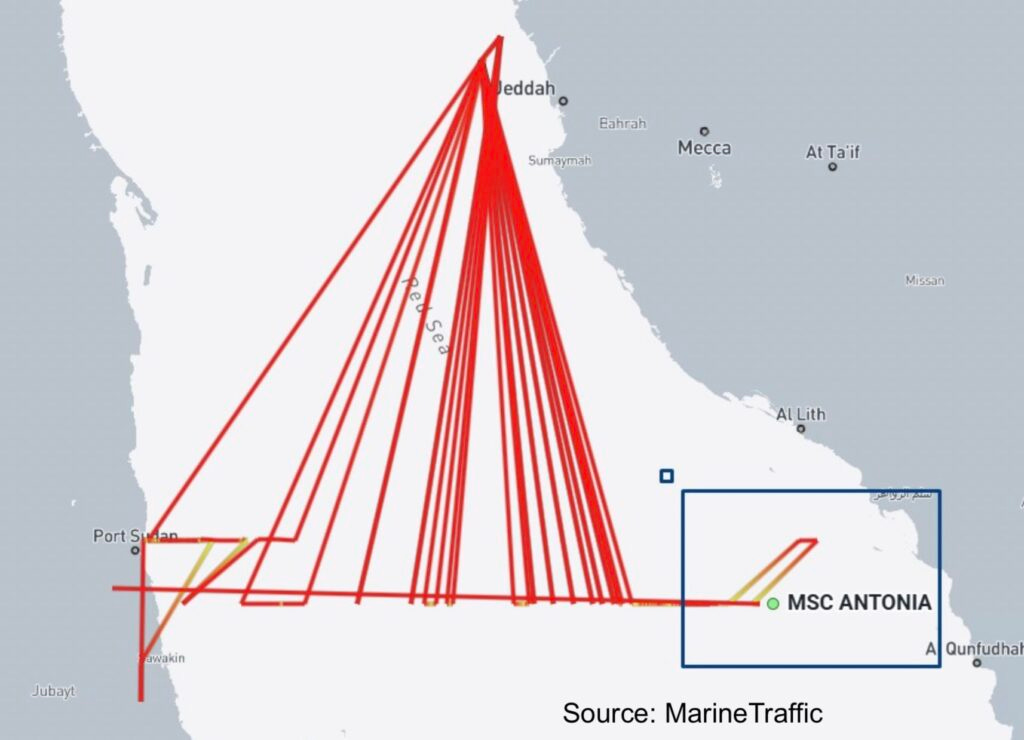Middle East Space Roundup: 12 to 18 May 2025
A summary of all the space news in the Greater Middle East over the past week, brought to you by AzurX
The following are the major space developments in the Greater Middle East region tracked by Middle East Space Monitor over the past week:
Saudi Arabia Space Developments
Saudi Arabia’s Arabsat to Partner With Canada’s Telesat for LEO SATCOM
Arabsat, headquartered in Saudi Arabia, has signed a deal with Canada-based Telesat for multi-gigabit broadband capacity from its forthcoming Lightspeed low-Earth orbit (LEO) constellation, as regional demand intensifies amid Starlink's expanding presence. The agreement, announced 14 May 2025, marks a strategic shift by the Saudi GEO operator to diversify into LEO services, just one day after Elon Musk confirmed Starlink’s regulatory approval in Saudi Arabia for maritime and aviation sectors. As competition from LEO constellations mounts, Arabsat joins other GEO incumbents in hedging against market disruption while reinforcing national connectivity ambitions. The deal is expected to be finalized by December 2025.
Saudi Arabia, United States, to Collaborate on Space Weather Cubesat As Part of Artemis II Mission
At the Saudi-U.S. Summit co-chaired by Crown Prince Mohammed bin Salman and President Donald Trump, both countries signed a landmark executive agreement between the Saudi Space Agency and NASA to collaborate on a Space Weather CubeSat mission as part of Artemis II. This marks a strategic step in Saudi Arabia’s growing role in space exploration. The agreement was one of several signed to deepen bilateral cooperation across defense, energy, and technology sectors, highlighting space as a key domain in the evolving U.S.-Saudi strategic partnership.
Elon Musk: Saudi Arabia Will Approve Starlink for Aviation & Maritime Uses
Elon Musk announced that Saudi Arabia has approved the use of Starlink for maritime and aviation applications, marking a significant expansion of SpaceX’s satellite internet services in the Gulf. The announcement, made during the Saudi-U.S. Investment Forum amid President Trump’s visit, aligns with broader U.S. efforts to promote Starlink in trade-sensitive countries. Musk also floated the idea of introducing Tesla robotaxis to the Kingdom. The move underscores Starlink’s growing geopolitical relevance, even as concerns mount over potential conflicts of interest tied to Musk’s dual roles in business and U.S. government advisory positions.
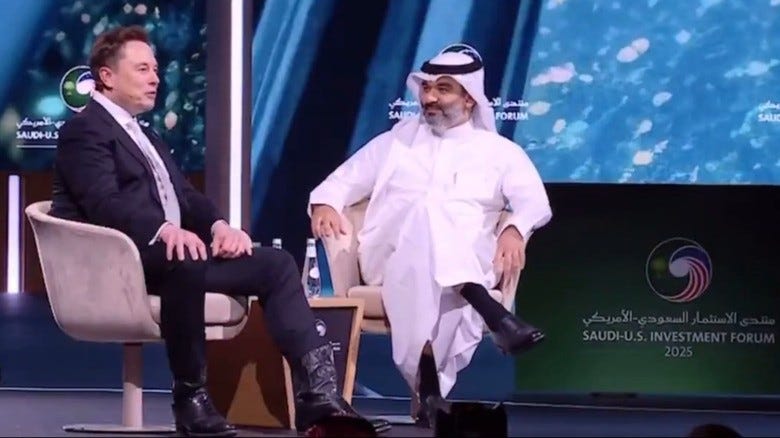
Saudi Arabia’s KACST Partners With Maxar Intelligence for Satellite Data
King Abdulaziz City for Science and Technology (KACST) has signed a strategic partnership with U.S.-based Maxar Intelligence to provide direct satellite access and advanced space data capabilities, supporting Saudi Arabia’s ambitions in urban planning, disaster response, and sustainable agriculture. Formalized during President Trump’s visit, the agreement positions KACST as a regional leader in geospatial intelligence and reflects the Kingdom’s broader vision to harness space technologies for economic diversification and infrastructure modernization.
Saudi Arabia’s KACST Deepens Ties With CalTech for Hyperspectral Satellite Imagery
Saudi Arabia’s King Abdulaziz City for Science and Technology (KACST) and Caltech have expanded their Joint Center of Excellence in Earth and Space Science with a new agreement focusing on hyperspectral satellite imagery to monitor methane emissions and mineral resources. The addendum also paves the way for future joint astronomy projects, enhanced researcher exchanges, and specialized training through Caltech’s CTME. This initiative aligns with Saudi Vision 2030 by advancing space-based research, developing national talent, and deepening international scientific collaboration.
Saudi Arabia’s Arabsat Partners With Green Valley for Playout X
Arabsat, headquartered in Saudi Arabia, has partnered with Grass Valley to launch Playout X, a suite of cloud-native broadcast services powered by the Agile Media Processing Platform (AMPP OS), marking a major digital transformation for the satellite operator. Unveiled at CABSAT 2025, the strategic shift from traditional infrastructure to a scalable, multitenant cloud architecture enhances flexibility, reduces hardware reliance, and supports rapid broadcast deployment across the Middle East, Africa, and beyond. This collaboration positions Arabsat to meet evolving media demands while reinforcing Grass Valley’s presence in the MENA broadcast technology market.
Saudi Arabia’s Arabsat Signs MoU With Denmark’s Quadsat for Spectrum Management and Antenna Qualification Services
Arabsat, headquartered in Saudi Arabia, and Denmark’s Quadsat signed a strategic MoU at CABSAT 2025 to enhance spectrum management and antenna qualification across Arabsat’s satellite fleet. The partnership will establish standardized testing and calibration protocols for ground antennas, streamline vendor selection, and enable geolocation of interference sources. By integrating Quadsat’s UAV-based RF measurement solutions, Arabsat aims to ensure high performance of flat panel antennas across multi-orbit systems, reinforcing service reliability and operational excellence in the increasingly complex satellite communications environment of the MENA region.
Saudi Arabia’s Arabsat Signs MoU With TVU Networks for IP-Based Satellite Media Delivery
Arabsat, headquartered in Saudi Arabia, and TVU Networks have signed a strategic MoU at CABSAT 2025 to jointly develop IP-based, satellite-integrated media delivery solutions for the MENA broadcast sector. The partnership will combine Arabsat’s regional satellite infrastructure with TVU’s cloud-native technologies—such as the TVU MediaHub—to modernize content distribution, support infrastructure upgrades, and offer customized services to broadcasters. The alliance also includes joint sales efforts and coordinated industry outreach to strengthen both companies' market presence in a rapidly evolving media landscape.
UAE Space News
Space Cooperation a Major Element of UAE-U.S. Strategic Partnership
During President Donald Trump’s May 2025 state visit to the UAE, both countries reaffirmed their strategic partnership with a strong emphasis on space cooperation. The leaders celebrated joint achievements in the Emirates Mars Mission, human spaceflight, and the Emirates Mission to the Asteroid Belt while committing to expand bilateral collaboration in deep space and lunar research. The visit also featured a space exploration exhibition where Dr. Sultan Al Neyadi briefed President Trump, symbolizing growing ties in space science and satellite applications. These discussions underscored the UAE’s rising role as a regional space power and highlighted space as a pillar of the broader US-UAE technology and defense alliance.

UAE’s Space42 Reports Q1 2025 Financial Results: Revenues Down, But Profits Strong
The UAE’s Space42 reported Q1 2025 revenue of $115 million, down 13% year-on-year due to timing shifts at Bayanat, yet maintained strong profitability with a 26% normalized net margin and $30 million in profit. Backed by nearly $7 billion in contracted future revenues and $895 million in cash, the AI-powered space technology firm advanced its four strategic pillars: launching new Earth observation satellites (Foresight-1 and -2), progressing its SAR and HAPS facilities, scaling its AI-driven GIQ platform with partners like FADA and EDGE, and expanding non-terrestrial connectivity with Thuraya-4 and Viasat collaborations. With robust financials and sovereign space infrastructure development underway, Space42 is positioning itself as a regional and global leader in dual-use satellite and geospatial solutions.
UAE Well-Positioned to Cooperate on Moon, Mars Missions With NASA Post-Artemis
As NASA adjusts its Moon-to-Mars exploration roadmap in response to a proposed 24% budget cut for 2026—most notably canceling the Gateway lunar station—the agency is expanding opportunities for international collaboration by repurposing existing components and inviting partners to help close critical technology gaps. This shift presents a strategic opening for space-ambitious countries like the UAE, whose investments in robotics, lunar mobility systems, satellite communications, and AI-backed mission operations—honed through the Rashid rover and Hope probe—align well with NASA's evolving Architecture Definition Document. According to NYU Abu Dhabi astrophysicist Dr. Dimitra Atri, the UAE is well positioned to play a leading role in power systems, surface infrastructure, and scientific payloads, with academic institutions like NYUAD contributing through research on lunar simulants and sustainable habitat technologies. Active participation not only reinforces the UAE’s scientific stature but also supports its long-term strategic objectives in STEM, innovation, and international space diplomacy.
Proposed NASA Budget Cuts Threatens International Coalition, UAE Included
The White House’s proposed $18.8 billion NASA budget for FY2026—representing a 24% cut—has sparked widespread concern across the global space community. The plan would cancel the Gateway station, phase out SLS and Orion after Artemis 3, and slash funding for science, Earth observation, the ISS, and STEM programs. Critics argue this threatens U.S. leadership in space, destabilizes international partnerships, and undermines ongoing programs involving Europe, Japan, Canada, and the UAE. While some commercial space groups cautiously welcome a shift toward Mars-focused, cost-effective private alternatives, others warn that abrupt program terminations could waste investments and fracture global collaboration. International partners now brace for potential realignment—possibly even independent missions—should Congress enact the proposed cuts.
UAE’s Emirates Airlines in Talks With SpaceX for Starlink In-Flight Connectivity
The UAE’s Emirates Airlines is in talks with SpaceX to explore integrating Starlink satellite internet across its fleet of over 250 widebody aircraft, with more than 300 additional jets on order. While the discussions signal a potential leap in onboard connectivity, details remain uncertain on whether the service would be universally available or restricted to premium passengers or loyalty members.
UAE’s MBRSC Showcases MBZ-SAT at Make it in the Emirates 2025
At Make it in the Emirates 2025, the UAE's Mohammed Bin Rashid Space Centre (MBRSC) is showcasing MBZ-SAT—the most advanced Earth observation satellite in the region—as a flagship example of how space missions can drive national industrial growth, innovation, and sovereign capability. Fully developed by Emirati engineers with 90% of its mechanical components sourced locally, MBZ-SAT highlights the UAE's maturing satellite manufacturing ecosystem through partnerships with firms like EDGE, Strata, EGA, and Rockford Xellerix. The mission underscores the strategic alignment of the UAE's space program with its broader economic vision, fostering a sustainable, knowledge-based economy anchored in advanced technology and global competitiveness.
UAE Space Agency Launches Second Cohort of National Space Academy
The UAE Space Agency’s National Space Academy has launched the second cohort of its Space Applications–Earth Observation program, training Emirati professionals to harness satellite data for real-world applications in environmental monitoring, national security, and urban planning. The 10-week course emphasizes hands-on, project-based learning, supporting the UAE’s broader strategy to build domestic geospatial and Earth observation capabilities. With support from Space42’s Bayanat, the program feeds into a national geoinformatics ecosystem, positioning satellite data as a critical enabler of smart governance, climate resilience, and defense innovation.
UAE’s BHS Media Group & Eutelsat Renew Satellite Contribution Contract
Eutelsat Group and UAE-based BHS Media Group have renewed their satellite contribution contract, extending capacity on the EUTELSAT-21B and -70B satellites to ensure uninterrupted, high-quality video services across the Middle East and North Africa region. This strategic renewal highlights BHS’s commitment to robust satellite-based broadcasting and reinforces Eutelsat’s position as a key infrastructure partner for media distribution in key orbital positions at 21°E and 70°E.
Israel Space Developments
Israel’s IAI & Phoenix Underwriting Submit Debt Settlement for Amos Spacecom
Israel Aerospace Industries (IAI), in partnership with Phoenix Underwriting, has submitted a new debt settlement proposal that would give IAI control of Amos Spacecom, the operator of the Amos satellite fleet, amid its $378 million bond debt crisis. The plan involves issuing $155 million in secured bonds, backed by first liens on all satellites, enabling repayment of most outstanding debt while leaving Spacecom with just $20 million in operational cash. This proposal marks a strategic return of IAI to Spacecom’s core operations and is expected to ease regulatory approvals for the takeover, positioning IAI as a stabilizing force in Israel’s commercial satellite sector.
Israel’s Ramon.Space Secures $70 Million Order From Eutelsat OneWeb
Israel’s Ramon.Space, a leading space-technology firm, has secured a landmark $70 million contract to supply advanced onboard satellite communication systems to Eutelsat OneWeb, marking its largest deal to date. The agreement positions Ramon.Space at the forefront of Europe’s push for satellite infrastructure autonomy and reflects rising demand for in-orbit data processing technologies with dual-use potential. As geopolitical tensions reshape the satellite market, this strategic partnership not only supports Europe's post-SpaceX diversification efforts but also boosts Ramon.Space’s prospects ahead of its anticipated Series B round and projected profitability by 2026.
Israel’s Gilat Completes Test Flight of Its ESR-2030Ku Electronically Steered Antenna
Israel’s Gilat Satellite Networks has successfully completed test flights of its ESR-2030Ku electronically steered antenna (ESA) on the OneWeb LEO network, demonstrating high-performance full-duplex connectivity with 195 Mbps downlink and 32 Mbps uplink. Partnering with Gogo for exclusive distribution in business aviation and defense markets, Gilat is positioning itself to capture growing demand for LEO-based ESA solutions in the mobility, defense, and in-flight connectivity sectors.
Iran Space News
Iran Pushes Launch of Two Pars Earth Observation Satellites to July 2025
Intelligence Online reports that the Iranian Space Agency has delayed the launch of its Earth observation satellites Pars-1B and Pars-2 to July 2025, signaling continued development in Iran’s satellite program despite technical or logistical setbacks. The mission underscores Iran’s strategic focus on enhancing domestic Earth observation capabilities, with implications for environmental monitoring, resource management, and national security.
Iran Expects Completion of Three-Space Infrastructure Sites by March 2026
Iran’s ICT Minister Sattar Hashemi announced the country will inaugurate three fully equipped satellite bases—Chabahar, Salmas, and Chenaran—by the end of the current Iranian calendar year (March 2026), marking a significant expansion of Iran’s domestic space infrastructure. The facilities, aimed at supporting satellite development and launch capabilities, will be commissioned in the presence of President Masoud Pezeshkian, underscoring the strategic importance Tehran places on advancing its national space program.
Iran’s Press TV Broadcasts on Intelsat-19 to Australia and Oceania
Press TV, Iran’s state-run English-language news network, has expanded its satellite footprint to Australia and Oceania via Intelsat-19 (166°E), joining its existing global distribution across multiple satellites. This move enhances its reach in the Asia-Pacific amid longstanding broadcast restrictions in Europe and North America, which the network attributes to politically motivated sanctions. iFilm English, IRIB’s entertainment channel, is also now available on Intelsat-19, further extending Iranian soft power through satellite-based media in underserved regions.
Oman Space Developments
Oman to Launch Oman Space Accelerators Program in Q3 2025
Oman is set to launch the Oman Space Accelerators program in Q3 2025 to catalyze its emerging space sector, with support from Ankaa Space and Technologies and the Ministry of Transport, Communications and Information Technology (MTCIT). Targeting ten Omani startups, the initiative will provide technical training, international mentorship, and investor access to integrate local innovation into the global space economy. As part of Oman’s broader National Programme for the Digital Economy, the accelerator underscores the country’s strategic ambition to grow ground-based space applications, boost private sector engagement, and position itself as a regional player in space technology.
Oman Lens Was First International Launch for China’s Star.Vision
Oman’s growing role in global space collaboration was spotlighted through the successful launch of a remote-sensing satellite developed by Omani startup Oman Lens in partnership with China’s Star. Vision and an Omani investment firm. Launched on 11 November 2024, aboard China’s Lijian-1 rocket, this mission marked the first commercial launch service by a Chinese firm for an international client, underscoring Oman’s entry into the commercial space sector and highlighting Southeast and West Asia’s increasing engagement in global space cooperation.
Other Regional Space News
Qatar’s Es’hailSat Adds Two Channels From Türkiye’s Misk Media to Es’hail-2
Qatar’s Es’hailSat has added two Misk Media channels to its Es’hail-2 satellite at 26° East, enhancing Arabic-language content distribution across the Middle East and North Africa. This partnership expands Es’hailSat’s diverse programming lineup and supports Misk Media’s mission to promote Arab culture and integration in Türkiye, while leveraging Es’hailSat’s robust infrastructure and regional broadcast footprint to maximize viewership.
Starlink LEO Satellite Communications Services is Activated in Bahrain
Starlink has activated its satellite internet service in Bahrain, marking its latest expansion in the Middle East following recent launches in Oman and Jordan. With services now available in several MENA countries and pending regulatory approval in Saudi Arabia and the UAE, Starlink is rapidly consolidating its regional footprint. The move aligns with its broader global strategy to outpace competitors like Amazon’s Project Kuiper by offering low-latency broadband connectivity via over 7,100 LEO satellites. The company is targeting sectors such as maritime and aviation, particularly in Gulf markets, as it scales toward a planned 42,000-satellite constellation.
Kuwait Reaffirms Commitment to Peaceful Uses of Outer Space and Space Cooperation
Kuwait has reaffirmed its commitment to international cooperation in space science and technology during a meeting between its UN ambassador in Vienna, Talal Al Fassam, and UNOOSA Director Aarti Holla-Maini. The discussion focused on expanding Kuwait’s engagement with global space initiatives for peaceful purposes and sustainable development. Kuwait highlighted milestones including the Um Al Aish satellite ground station, the 2023 launch of KuwaitSat-1, and the recent establishment of its National Space Research Center, underscoring its growing role in the global space ecosystem.
Eutelsat to Broadcast Saudi Arabia’s Rotana & Türkiye’s Vestel Across MENA
Eutelsat has partnered with Saudi Arabia’s Rotana Media Services and Türkiye’s Vestel to pioneer geographic-based targeted advertising for satellite TV, aiming to transform monetization in the free-to-air (FTA) broadcast space. Leveraging its Sat.tv platform, Eutelsat will re-engineer delivery, playout, and return-channel mechanisms to enable advertisers to reach segmented audiences across 35 million MENA households within five years. The initiative promises to blend the scale of satellite broadcasting with the precision of digital advertising, enhancing revenue potential and accountability through advanced targeting and audience data.
ABS & SpaceBridge Partner for Managed Satellite Data Services Across the Middle East
ABS and SpaceBridge have announced a strategic collaboration to expand managed satellite data services across Europe, the Middle East, and Africa, targeting enterprises, government agencies, and MNOs. Revealed at CABSAT in Dubai, UAE, the partnership aims to deliver flexible and scalable broadband and internet trunking solutions in high-growth regions, enhancing ABS’s managed service capabilities through SpaceBridge’s advanced ground technology platforms.
GPS Spoofing in the Red Sea Grounds Merchant Vessel Near Jeddah Port
Windward has reported that the grounding of the MSC Antonia near Jeddah Port on 10 May 2025 was likely caused by GPS spoofing, based on spoofing patterns identified by its Maritime AI™ platform. The incident underscores rising threats to navigation integrity in the Red Sea, a critical global trade corridor, and highlights the growing risk of signal manipulation affecting commercial shipping operations in the region.
Space Features Prominently in Morocco-U.S. African Lion Military Exercise
The 21st African Lion military exercise, co-hosted by Morocco and the U.S., commenced in Agadir with over 10,000 troops from 40+ countries participating. For the first time, the exercise integrates space and satellite operations alongside land, air, maritime, and cyber domains—underscoring the growing role of space-based capabilities in multinational defense coordination, interoperability, and regional security.
Azerbaijan’s Azercomos Wins Best VSAT Provider Award For Its Azconnexus Solution
Azercosmos has been named "Best VSAT Service Provider" at the BroadcastPro Manufacturer Awards for its Azconnexus broadband solution, solidifying its reputation in the global satellite communications market. Leveraging Azerspace-1 and Azerspace-2, Azconnexus delivers high-speed, reliable connectivity via C- and Ku-band for government, corporate, and remote operations. The award marks a key milestone for Azerbaijan’s space sector, showcasing its growing influence in satellite-enabled infrastructure and emergency communications across challenging geographies.
Other Regional Space News in Brief:
A UAE delegation visited Sweden to strengthen cooperation in research and advanced technology, including space;
The UAE Space Agency has received the "Future Fit" Seal for its Space Data Centre, a national initiative enhancing digital infrastructure to support the country's space goals;
Algeria and Slovenia to collaborate on space affairs as part of a wide-ranging bilateral agreement;
Switzerland’s State Secretary for Education, Research and Innovation, Martina Hirayama, visits the UAE’s Mohammed Bin Rashid Space Centre (MBRSC).
Be sure to catch up with space activities in the region in the next edition of Middle East Space Monitor’s space roundup!





